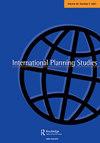Blindness and illumination of state spatial strategies in producing extended urban space: a case from Cepu oil and gas mining area, Indonesia
IF 1.5
Q4 REGIONAL & URBAN PLANNING
引用次数: 0
Abstract
ABSTRACT This paper explains the contradictions embedded within various hierarchical spatial regulations that play a role in facilitating or hindering the extended urbanization processes. By taking the case of the largest oil and gas area producers in the hinterland region of Cepu, we analyzed the content of spatial policies from the national to local levels related to oil and gas mining, regional infrastructure, and urban centre using TPSN (territory, place, scale, network) framework to reveal the knowledge production of spatial dimensions. As a result, we revealed Lefebvre's blind field concept as a metaphor for blindness and illumination of territorial regulation to explain the coherence and disharmony of multiscale spatial plans, although in the integrated spatial management framework. These findings contribute to the concept of state spatial strategies in mediating the production of the operational landscape for the upstream-midstream oil and gas sector.城市空间扩张中国家空间战略的盲目性与启示——以印尼Cepu油气矿区为例
摘要本文解释了嵌入在各种层次空间规则中的矛盾,这些规则在促进或阻碍城市化进程中发挥着作用。以策普内陆地区最大的油气区域生产商为例,利用TPSN(地域、地点、规模、网络)框架,分析了从国家到地方层面与油气开采、区域基础设施和城市中心相关的空间政策内容,揭示了空间维度的知识生产。因此,我们揭示了列斐伏尔的盲场概念,将其比喻为领土调控的盲目性和照明性,以解释多尺度空间规划的一致性和不和谐性,尽管是在综合空间管理框架中。这些发现有助于国家空间战略的概念,以调解上游中游石油和天然气行业的运营景观的生产。
本文章由计算机程序翻译,如有差异,请以英文原文为准。
求助全文
约1分钟内获得全文
求助全文
来源期刊

International Planning Studies
REGIONAL & URBAN PLANNING-
CiteScore
4.60
自引率
4.80%
发文量
20
期刊介绍:
Planning, at urban, regional, national and international levels, faces new challenges, notably those related to the growth of globalisation as both an objective socio-economic process and a shift in policy-maker perceptions and modes of analysis. International Planning Studies (IPS) addresses these issues by publishing quality research in a variety of specific fields and from a range of theoretical and normative perspectives, which helps improve understanding of the actual and potential role of planning and planners in this context.
 求助内容:
求助内容: 应助结果提醒方式:
应助结果提醒方式:


